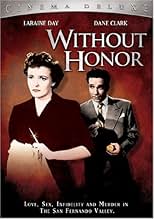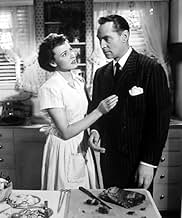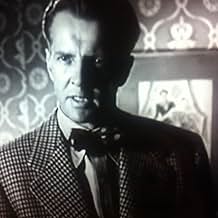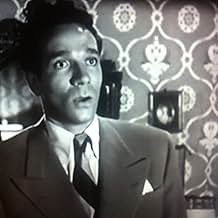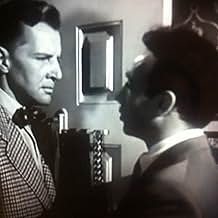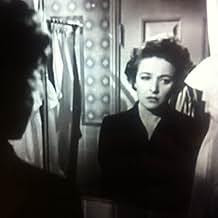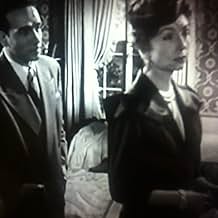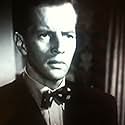Jane Bandle has recently married, but Bill, her husband's brother, tries to wreck her marriage because Jane rejected his sexual advances before her marriage.Jane Bandle has recently married, but Bill, her husband's brother, tries to wreck her marriage because Jane rejected his sexual advances before her marriage.Jane Bandle has recently married, but Bill, her husband's brother, tries to wreck her marriage because Jane rejected his sexual advances before her marriage.
- Awards
- 1 nomination total
Marjorie Stapp
- Neighbor's Wife
- (as Margie Stapp)
Irving Pichel
- Narrator
- (voice)
- (uncredited)
- Director
- Writer
- All cast & crew
- Production, box office & more at IMDbPro
Featured reviews
I saw this when I was 10, when movies were double features and the fare changed weekly. I only remembered it because I loved Day, not because of being an actress, but because she was Leo Durocher's wife and I was a Baseball nut. I saw it again recently on TCM. This movie defies a reason for being, except that the studios needed constant fodder and this film proves the point that it was often volume over content. We are still being crammed with movies that ask the same question, What Were They Thinking, but lack the old excuse.
Day's acting, consisting primarily from 'reacting', is an embarrassment on the same footing as the unlikely dialogue given to the rest of the cast. Her opening scene with Clark makes for great comedy as she goes thru a 360 degree range of reactions to his 25 or so separate avenues of dialogue, mostly questions she never answers. And he's oblivious to the strangeness of her conduct. From there it only gets worse.
It's hard to believe it's the same Day who shown so brilliantly in Mr. Lucky or a movie with such confusing plot turns, but unlike The Big Sleep, where you didn't notice or care.
Day's acting, consisting primarily from 'reacting', is an embarrassment on the same footing as the unlikely dialogue given to the rest of the cast. Her opening scene with Clark makes for great comedy as she goes thru a 360 degree range of reactions to his 25 or so separate avenues of dialogue, mostly questions she never answers. And he's oblivious to the strangeness of her conduct. From there it only gets worse.
It's hard to believe it's the same Day who shown so brilliantly in Mr. Lucky or a movie with such confusing plot turns, but unlike The Big Sleep, where you didn't notice or care.
Franchot Tone, him married to Agnes Moorehead and Laraine Day, her married to
Bruce Bennett have been carrying on an affair, but Tone comes over to Day's house while Bennett's away and says time to end it. Bennett's a dull sort and
Day doesn't want things to end. She gets positively hysterical and remains so
the rest of the film with the events that follow. Quite a bit does follow.
Manipulating all that is going on is Dane Clark who is Bennett's brother and it's positively Iago like the way he controls all around him. This might have been Dane Clark's best moment on the big screen as it is Laraine Day's.
If this is ever remade and maybe it should be, it will be a great example about how the Code could nearly ruin a story. The censorship was such that so much was left out in the telling.
Still a nice piece of melodrama.
Manipulating all that is going on is Dane Clark who is Bennett's brother and it's positively Iago like the way he controls all around him. This might have been Dane Clark's best moment on the big screen as it is Laraine Day's.
If this is ever remade and maybe it should be, it will be a great example about how the Code could nearly ruin a story. The censorship was such that so much was left out in the telling.
Still a nice piece of melodrama.
What an odd picture. An Overwrought Melodrama with a capital O and a capital M this breaks out of the starting gate hitting high C and continues at a fevered pitch right up to its conclusion.
Unhappy Laraine stabs caddish Franchot by accident then rambles hysterically while the callously odious Dane Clark circles around making her life hell. The one beacon of restraint in the entire enterprise is Agnes Moorehead who shows up none too soon and steals the picture with a controlled and dignified performance while all around her her cast-mates are swallowing scenery whole.
Unhappy Laraine stabs caddish Franchot by accident then rambles hysterically while the callously odious Dane Clark circles around making her life hell. The one beacon of restraint in the entire enterprise is Agnes Moorehead who shows up none too soon and steals the picture with a controlled and dignified performance while all around her her cast-mates are swallowing scenery whole.
The problems that may be inherent in the story were made worse because the then-still-somewhat-powerful arbiters of censorship gave the film a rough time. The objection, I would assume, resulted from the fact that the Laraine Day character is allowed to live and not 'pay for her almost-fatal-act-of-murder'. Day didn't always get a chance to grab the parts that lead to awards, but she is more than good in this one. Sorry to contradict one of the earlier writers on the piece, but the worst acting in the film, and the only truly awful performance, is the one by Agnes Moorehead, wearing an outfit that could have come from Ed Wood. This is far from an unwatchable film... it does have suspense...and the ending is surprising in denouement. It is forgotten, I admit, but this film did earn considerable attention in the news regarding its producers' fights to get it released without disastrous cuts. Thus, a moment in the censorship issues that were finally blasted apart by people like Otto Preminger.
Without Honor is directed by Irving Pichel and written by James Pope. It stars Dane Clark, Laraine Day, Franchot Tone and Agnes Moorehead. Music is by Max Steiner and cinematography by Lionel Lindon.
A mixed bag on offer in this one, where a broth of "sins" is stirred suitably in predominantly one location. Set-up bares a striking resemblance to Hitchcock's Rope released the previous year, where a group of characters are thrust together in one living room deconstructing their sins, shattered dreams and ulterior motives - all while a supposed dead body lays prone in one of the bedrooms.
The thematics at work are prime film noir, adultery, suicide attempt, sexual aggression, jealous agenda, duping and etc, all of which only comes to life half way through the piece. Here in is the problem, the pic asks for a lot of patience from the viewer before really getting going, which although the character group dynamic is pungent with an unsavoury odour, it never fully gets out of first gear.
Things aren't helped by the flat visual look of the piece, where with the story set in daytime, we yearn for a bit of noir flourish from one of the ace noir photographers of the time. Then there's Steiner's score, which is a cracker, ebullience in abundance, only it's in the wrong film! Moorehead is wasted in what is ultimately a walk on passive role, but at least Clark and Day nail the traits of their respective characters.
No hidden gem here, and noir hunters should be advised this is only noir from a plot perspective, but enough damaged human conditioning here to make it above average. 6.5/10
A mixed bag on offer in this one, where a broth of "sins" is stirred suitably in predominantly one location. Set-up bares a striking resemblance to Hitchcock's Rope released the previous year, where a group of characters are thrust together in one living room deconstructing their sins, shattered dreams and ulterior motives - all while a supposed dead body lays prone in one of the bedrooms.
The thematics at work are prime film noir, adultery, suicide attempt, sexual aggression, jealous agenda, duping and etc, all of which only comes to life half way through the piece. Here in is the problem, the pic asks for a lot of patience from the viewer before really getting going, which although the character group dynamic is pungent with an unsavoury odour, it never fully gets out of first gear.
Things aren't helped by the flat visual look of the piece, where with the story set in daytime, we yearn for a bit of noir flourish from one of the ace noir photographers of the time. Then there's Steiner's score, which is a cracker, ebullience in abundance, only it's in the wrong film! Moorehead is wasted in what is ultimately a walk on passive role, but at least Clark and Day nail the traits of their respective characters.
No hidden gem here, and noir hunters should be advised this is only noir from a plot perspective, but enough damaged human conditioning here to make it above average. 6.5/10
Did you know
- TriviaThis film offers a rare glimpse at a contemporary 1949 television set, a bulky table model with a ten-inch rectangular screen, which commonly was required to be "set up" by qualified technicians who also needed to install an antenna on the roof before proper reception could be achieved. Commercial television broadcasts had begun in Los Angeles two years earlier in 1947 on KTLA (Channel 5).
- GoofsJane is said to have broken a heel In the fall that caused her to miss her escape by bus, but as she picks up a broken heel off the ground and carries it with her, the heels on the shoes on both her feet remain intact and attached.
- Quotes
Fred Bandle: [picking Jane up on the dusty road, oblivious to her foiled attempt at escape] Where were you? Out for a walk? You busted a heel, huh? Well you shouldn't wear heels on a street like this.
Details
- Runtime
- 1h 9m(69 min)
- Color
- Aspect ratio
- 1.37 : 1
Contribute to this page
Suggest an edit or add missing content

